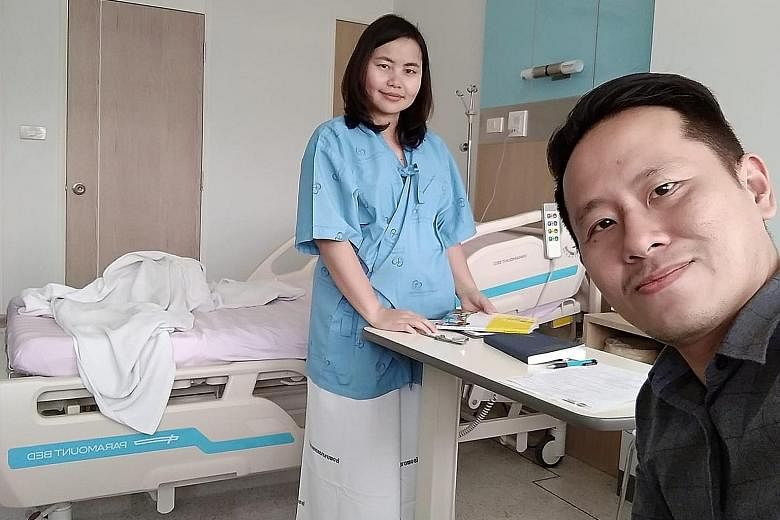After undergoing several tests at different hospitals in Thailand, Singaporean Eugene Wee and his pregnant Thai wife Kanokrat Suebsakwong were told their unborn baby had trisomy 18.
But the couple, both 37, later saw the news of their unborn child's serious medical condition as an opportunity to help others.
More than half of all babies with trisomy 18, a genetic disorder caused by an error in cell division, die before they are born. Of those who survive, most die within five to 15 days.
When the couple were at the Maharaj Nakorn Chiang Mai Hospital, medical researchers at Chiang Mai University, which is linked to the hospital, asked them if the full foetus could be "retained" for future research and studies.
This is because the condition is very rare. Only one in 5,000 foetuses develops trisomy 18.
It meant that Mr Wee's wife would have to undergo a long, painful labour to deliver a stillborn baby who would then be donated to the hospital.
Mr Wee told The Straits Times yesterday that the couple, who have been married for less than two years, knew there was no way they could save their child.
However, by donating the foetus, there was a chance they could help medical students learn more about the rare condition, and pave the way for a successful medical intervention in the future.
So, about three weeks ago, the couple proceeded for their child to be delivered stillborn in the fifth month of the pregnancy. The procedure took more than 30 hours and was difficult for the mother as the foetus was swollen, Mr Wee said.
He said their baby's condition before the delivery was "bad", but declined to elaborate.
Asked how the couple had the strength to make it through the procedure, he said: "I think it's probably our Christian faith that kept us going in those very challenging times."
Mr Wee is founder and executive director of Radion International, a Christian relief and development agency serving vulnerable communities. His wife is a volunteer in the organisation.
In a Facebook post on Sunday, Mr Wee called his wife his "hero" and quoted her as saying: "If my child needs to die, then it should not have to be in vain."
Dr Christopher Chong, an obstetrician and gynaecologist at Gleneagles Hospital, said a stillborn child can either be delivered through a cesarean or a natural delivery.
However, attempting to deliver the baby naturally requires labour to first be induced in the mother. The entire process will often take one to two days and "can be a lengthy process which is very traumatic to the mother".
Despite this, many patients opt for natural delivery as, in addition to needing a longer post-operation recovery, a cesarean delivery leaves a scar in the mother's womb which may affect her next pregnancy.
Dr Chong said there are tests that parents-to-be can take to determine if their baby has trisomy 18 or trisomy 21, which is also known as Down syndrome.
These include the Oscar test and the Triple test - both have an accuracy rate of 80 to 90 per cent - as well as more invasive and expensive tests like the amniocentesis procedure and chorionic villus sampling, which have a higher accuracy rate of 99 per cent.
Another option is non-invasive prenatal testing, which analyses the baby's DNA in the mother's blood to look out for chromosomal abnormalities.
The test has an accuracy rate of 99 per cent and, while it is now the most common procedure, it is also more costly than the others, Dr Chong said.
He said the older the mother is, the higher the risk of her baby developing a trisomy disorder, adding that the risk rises drastically after the mother turns 35, due to the deteriorating quality of her eggs.


